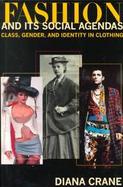Crane compares nineteenth-century societies -- France and the United States -- where social class was the most salient aspect of social identity signified in clothing with late twentieth -century America, where lifestyle, gender, sexual orientation, age, and ethnicity are more meaningful to individuals in constructing their wardrobes. Today, clothes worn at work signify social class, but leisure clothes convey meanings ranging from trite to political. In today's multicode societies, clothes inhibit as well as facilitate communication between highly fragmented social groups. Crane extends her comparison by showing how nineteenth-century French designers created fashions that suited lifestyles of Paris elites but that were also widely adopted outside France. By contrast, today's designers operate in a global marketplace, shaped by television, film, and popular music. No longer confined to elites, trendsetters are drawn from many social groups, and most trends have short trajectories. To assess the impact of fashion on women. Crane uses voices of college-aged and middle-aged women who took part in focus groups. These discussions yield fascinating information about women's perceptions of female identity and sexuality in the fashion industry.
| Seller | Condition | Comments | Price |
|
Goodwill of Greater Milwaukee
|
Acceptable |
$19.62
|
|
ZBK Books
|
Good |
$28.67
|
|
ErgodeBooks
|
Good |
$40.46
|
|
Bonita
|
Good
|
$59.40
|
|
ErgodeBooks
|
New |
$72.25
|
|
GridFreed
|
New |
$105.86
|
|
Bonita
|
New
|
$114.43
|
|
RARE BOOK CELLAR
|
Like New |
$148.61
|


